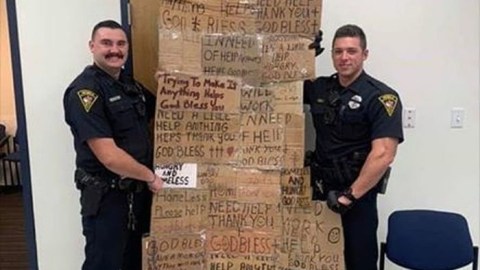Cops make ‘quilt’ out of homeless signs. Is panhandling free speech?

- In a photo posted to Facebook, two Alabama police officers can be seen holding a collection of signs that police had ostensibly taken from homeless people.
- By Monday afternoon, the photo had been shared thousands of times on social media, where some people were calling for the officers to be fired.
- The incident raises questions over an unclear legal question in the U.S.: Is nonviolent panhandling a form of protected speech?
Several Alabama police officers sparked online outrage after posting to Facebook a photo of two cops holding a “homeless quilt” made from confiscated panhandling signs.
The officers smiling in the photo, Preston McGraw and Alexandre Olivier, are recent graduates of the Mobile Police Academy, according to Al.com.Two other people are mentioned in the Facebook post, but it’s not clear who they are, or whether they work for the Mobile Police Department. In the Facebook photo, McGraw and Olivier hold signs that display pleas like, “Trying to make it, anything helps, god bless you.” The photo caption reads:
“Wanna wish everybody in the 4th precinct a Merry Christmas, especially our captain. Hope you enjoy our homeless quilt! Sincerely, Panhandler patrol.”
By Monday afternoon, the photo had been shared thousands of times, with reactions being almost universally negative.
In a Facebook post published on Monday, Chief of Police Lawrence Battiste offered the department’s “sincerest apology for the insensitive gesture.”
“Although we do not condone panhandling and must enforce the city ordinances that limit panhandling, it is never our intent or desire as a police department to make light of those who find themselves in a homeless state,” the post reads. “Rather, our position has always been to partner with community service providers to help us help those faced with homelessness with hope to improve their quality of life.”
The photo clearly raises questions over the department’s relationship with the local homeless community, and over the officers’ general fitness for duty. Some Twitter and Facebook users noted that it seemed like an especially cruel thing to do, considering the timing of the photo and the “Merry Christmas” caption suggests the signs were confiscated over the Christmas holiday.
But the incident also highlights a broader legal question: Is panhandling protected by the First Amendment?
The constitutionality of panhandling laws
Should panhandling be a crime? Should police have the power to confiscate panhandling signs? To answer those questions, you have to consider how the courts have viewed panhandling in the framework of the First Amendment.
For decades, many U.S. cities have passed — and have been sued over — panhandling laws. Supporters of these laws generally frame panhandling as a public safety issue. Meanwhile, opponents argue that the laws infringe on free speech rights. In any case, panhandling laws vary. For example, ordinances that ban aggressive panhandling (solicitation that includes menace or intimidation) aren’t controversial. But more restrictive laws are — such as those that ban panhandling in certain areas: subways, airports, state fair grounds.
The courts have generally recognized that “solicitation for money is closely intertwined with speech” and that “solicitation to pay or contribute money is protected under the First Amendment,” as the Supreme Court wrote in Schaumburg v. Citizens for a Better Environment (1980). The key constitutional question among these cases is whether panhandling laws are content-neutral — meaning they don’t ban a specific type of speech or message — given that content-based restrictions are considered to violate the First Amendment.
In 2015, the Supreme Court ruling reaffirmed this content-based interpretation. The ruling, from Reed v. Town of Gilbert, found that laws can’t treat signs differently based on their content. That case dealt with church signs, but the ruling has since been cited to help strike down numerous panhandling laws across the country.
“[The Reed case] has placed literally every panhandling ordinance in the United States at least under risk,” First Amendment scholar Enrique Armijo, associate dean for academic affairs at Elon University School of Law, told NPR.
The case has led some cities to try other ways of criminalizing panhandling. In April, for example, a federal district judge struck down an Arkansas city’s law that banned physical interaction between pedestrians and vehicle occupants. Judge Robert Dawson wrote that the law infringed upon speech.
“The Court can think of no reason why a pedestrian would intentionally attempt physical interaction with a motor vehicle or its occupants other than to communicate a message.”
However, unless the Supreme Court issues a clear ruling on the constitutionality of panhandling, it seems these kinds of laws will remain legally contentious, given that they’re currently on the books in hundreds of cities across the U.S.





